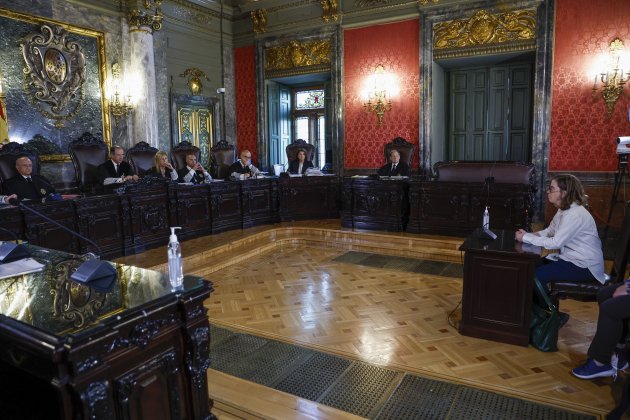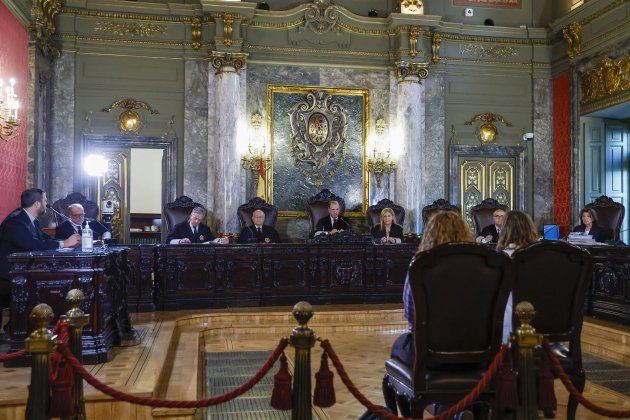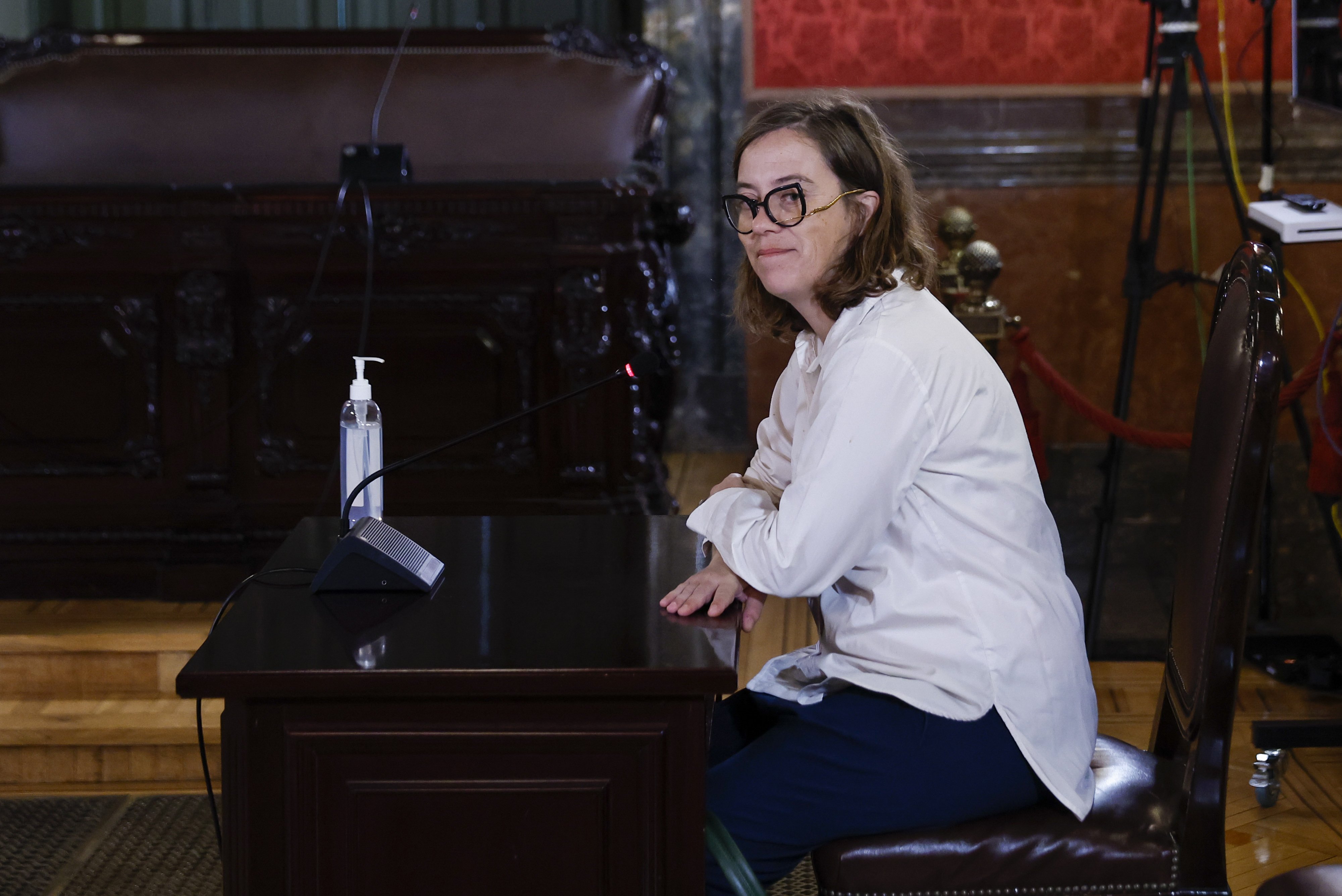Reaffirmation. "I didn't want to respond to the extreme right, who represent fascism, racism and sexism." Speaking in Catalan and with a translator beside her, CUP deputy Eulàlia Reguant testified this Wednesday before Spain's Supreme Court that, having been called as a witness in the 2019 trial for rebellion and sedition of the leaders of the Catalan independence process, she did not want to respond to the private prosecution by the right-wing political party Vox because it affected her dignity and ideological freedom. That refusal to respond, a right which witnesses do not have, led to today's trial. In fact, today, Reguant exercised the right which defendants do have, and only answered the questions put by her lawyer, Daniel Amelang, who called for her acquittal. Prosecutor Carmelo Quintana demanded that she be sentenced to a four month prison sentence and ban from holding public office for the refusal to testify as a witness, arguing that the far-left MP's position "is contradictory" because "she stated that she would accept the consequences" of her actions.
The prosecutor also indicated that Reguant was elected as a member of parliament "after" her criminal proceedings and, therefore, her possible disqualification from holding office is "an extra-criminal consequence". The prosecutor referred to the case of the Canary Islands deputy in Congress Alberto Rodríguez, whose ban from office was dictated by the same presiding judge hearing the trial of Reguant - judge Miguel Colmenero - who justified the ban that was imposed, despite admitting that that sentence is pending an appeal to the Constitutional Court.
Collective opposition to Vox
Making use of her right to make concluding remarks to the court, Eulàlia Reguant affirmed that apart from her individual position, the opposition to the extreme right is "collective". She recalled that the defence lawyers of Jordi Cuixart, then president of Òmnium Cultural, several times requested the expulsion of Vox from the proceedings against the Catalan pro-independence leaders, and that the judicial refusal showed that Vox was "a political tool of the Spanish state's repression". The presiding judge advised Reguant that she could not make a political allegation, but she finished her statement denouncing the thousands of people who have faced "retaliation by the state". Before the trial, the CUP politician was given support by representatives of the pro-independence parties and organizations such as Òmnium Cultural.

In the hearing, Reguant's lawyer explained to the seven judges of the Supreme Court - with judge Susana Polo, as spokesperson judge - that there had been a breach of her right not to be penalized twice for the same offence, since the court imposed a fine of 2,500 euros on herself and Antonio Baños, and now, with the trial, they want to punish her for the same action. The prosecutor, however, indicated that the law allows the sanction and criminal trial if the person "persists" in their refusal to testify, unless certain exonerating circumstances exist. In her statement, Reguant insisted that she carried out an action of conscientious objection: "If one accepts the presence of those who deny fundamental rights it makes it impossible for justice to be just."
Judge Marchena's action
In the rapid interrogation, Eulàlia Reguant detailed that she was "isolated" and that she knew nothing of the court's reaction when Antonio Baños, appearing as a witness just before her, refused to answer the questions put by Vox. The CUP deputy also recalled that during the trial, one of the defence lawyers proposed to judge Manuel Marchena that he would ask Vox's questions, and that she would then answer them, as well as the questions from the public prosecutor and the rest of the parties, as he tried to do with Baños, but no longer with Reguant. In fact, Antonio Baños will be tried on Thursday for the same alleged offence, in his case in an ordinary criminal court in Madrid, as he no longer an MP.
The deputy was not given an order
In the defence's summing up, lawyer Daniel Amelang stated that there was no "clear and forceful order" from judge Marchena, as required in the offence of serious disobedience of which Eulàlia Reguant was accused. He insisted that Reguant had stated that she would bear all the consequences in the trial because "she fervently believed that it was so, she considered that answering the questions was a negation of her own personal dignity. The presiding judge did not attempt another formula under which she would declare nor did he inquire about her moral injury", argued the lawyer, who also affirmed that the court did not warn her of the consequences, but abandoned her statement as concluded, and that what the prosecutor claims in the indictment "is not included in the record". The lawyer specified that Reguant was not given an order personally to obey, as required for the crime of disobedience, and he cited the acquittal of fellow CUP politician Mireia Boya by the Catalan High Court because she was not formally given an order by the Constitutional Court, in her case, to cease any action in support of the independence process. The "tenacious and forceful" resistance required in the definition of the offence was not shown either, according to Amelang, who added that the disobedience is, at most, of a mild nature, and punishable in an administrative trial.

As a consequence of all this, the lawyer called for Reguant's acquittal because she was exercising her freedom of expression. In addition, he described as "disproportionate" the demand for a prison sentence that could affect her in her political position when the action could also be punished with a fine. Amelang stated that there have been undue delays in the procedure, which he asserts was paralysed for 9 months when Reguant became an MP in the Catalan Parliament, an assertion that the prosecutor does not share. The trial is over, with the case now in the hands of the Supreme Court judges.

